Is Cheese Bad for Dogs
23.04.2021.
We are huge cheese fans, and we will gladly stuff ourselves with any kind of cheese we get. We think it is one of the tastiest things in our diet. In fact, you could even say we eat too much of it. While that might not be the best thing for our diet, since overeating on one thing is never actually good. However, that required us to become experts on the questions regarding dogs and cheese.
If you are anything like us, and you love cheese, you probably wondered, “Can dogs eat cheese?” or “Is cheese bad for dogs?” After all, cheese is made from milk, and puppies drink milk, right? The shortest possible answer would be - yes, dogs can eat cheese. However, before you start sharing your cheddar or brie with your dog, there are a few things you should know about feeding your dog cheese.
Is cheese good for dogs?
Cheese contains some healthy nutrients that might be beneficial for our dogs and us. Of course, the first condition is - don’t overfeed your dog on a single ingredient. Dogs seem to love the taste of cheese, and they will be very motivated if you use cheese as training snacks. Plus, cheese is one of the best ways to hide pills your dog has to take. Some of the best things cheese can offer our dogs and us are;
- Protein - Cheese contains protein, and protein is the most important ingredient in your dog’s diet. Their body uses protein to build and repair muscles and bones. The body will use protein to produce hormones and enzymes.
- Vitamin A - Cheese even contains healthy, essential vitamins. One of those vitamins is vitamin A. This vitamin is necessary for normal reproduction, vision, and immune system.
- B-complex vitamins - B vitamins play vital parts in all sorts of body processes and functions. They are necessary for cell metabolism, brain functions, and energy levels.
- Calcium - Calcium is one of the body’s most essential minerals. Calcium keeps bones and teeth healthy, and the muscles, heart, and nerves need calcium to normally perform their duties.
- Essential fatty acids - Essential fatty acids play vital roles in different body functions. They promote coat and skin health and help prevent heart diseases, eczema, rheumatoid arthritis, help control lupus, and prevent stroke.
Cheese is made from milk, but it contains less lactose than milk. If you want to know if dogs can drink milk, check out this article - Can dogs drink milk?
Is cheese bad for dogs?
Like anything else in life, if you overdo it with cheese, it can become bad for your dog. In some cases, cheese can cause a stomach upset. Some dogs are lactose intolerant, so you might need to check if that is the case with your dog. The first time you give your dog cheese, you should make sure you keep an eye on them for signs of lactose intolerance like stomach upset, excessive gas, and even vomiting.
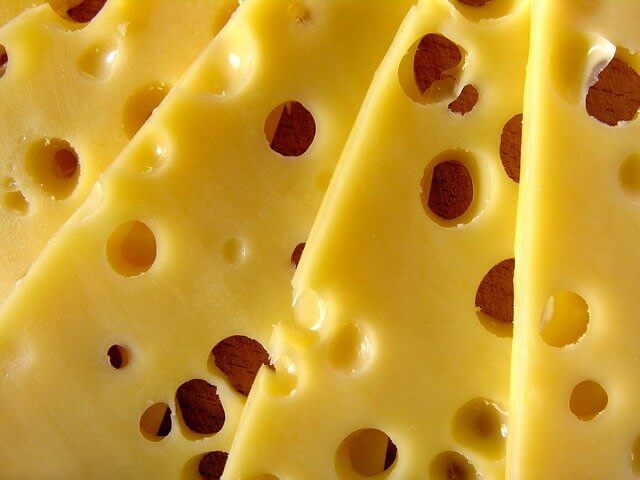
Dogs that are overweight should avoid eating cheese. Cheese contains fats, and if your dog is overweight, you should avoid giving them any cheese. Dog obesity is a growing problem in the US. If you want to know more about it, check out this article - Dog obesity. Another potential issue with giving your dog food with high fat content is pancreatitis. The dog’s pancreas can get inflamed, and this health issue is very painful. You can read more about it here - Pancreatitis in dogs.
The same goes for dogs with kidney issues. Cheeses usually have high salt content, so dogs with kidney issues should avoid them. The best thing you could do is make sure your dog is on a special diet that will promote kidney health and that diet doesn’t include cheese.
Dogs with weak stomachs, gastritis, or other similar issues should not eat cheese. They already have bad reactions to things that are not a part of their usual diets, so feeding them cheese would be a terrible idea.
How to safely feed cheese to your dog?
The critical thing to remember is - give cheese to your dog moderately. Do not overfeed them on cheese because it will lead to weight gain and potentially to obesity. That will significantly shorten your dog’s lifespan and cause all sorts of health issues.

Make sure you treat cheese as a rare-case dog treat. Your dog will love the taste of it most likely, but you need to show restraint and not give in to their begging or whining. Keep in mind that it is for your dog’s sake. If you have to give your dog cheese, make sure it is not often, and you give them tiny pieces. Here are some types of cheese dog owners might want to share with their dogs;
Can dogs eat cream cheese?
Cream cheese might be safe for dogs, but that will entirely depend on the type. Ideally, pick cream cheese with a lower fat content and make sure it doesn’t contain anything from the “No-No” list. Things like onions, garlic, or other spices are not safe for dogs to eat. Make sure the cream cheese you pick doesn’t contain it.
Can dogs eat cottage cheese?
Cottage cheese is one of the safest cheese options you can give to your dog. It has a lower fat and sodium content, so if you can pick, pick cottage cheese. It might not be as tasty as other “fatter” cheeses, but it is the best option for your dog.
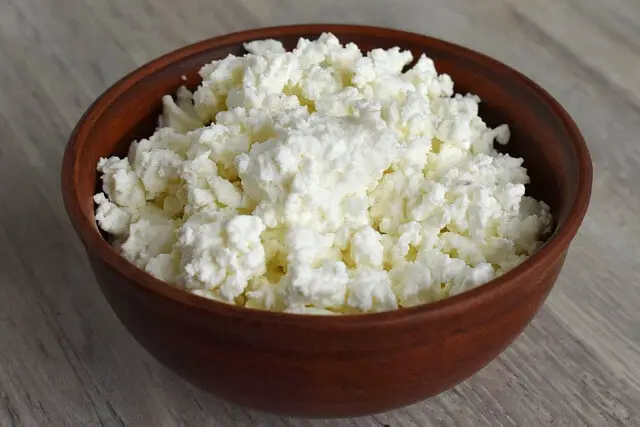
Can dogs eat blue cheese?
Blue cheese is the worst choice you can make for your dog. Blue cheese is made with fungus such as Stilton. It can produce a substance called roquefortine C, which dogs are really sensitive to. If your dog manages to grab some of your blue cheese, keep an eye on these symptoms;
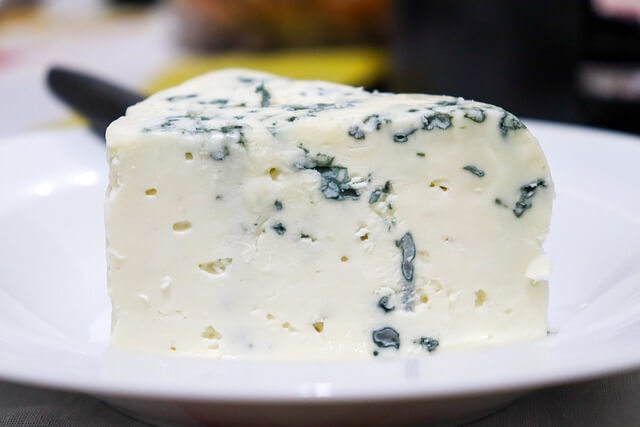
Dogs love eating human food, even though it can be dangerous for them. A common thing most households have is bread. Check out this article - Can dogs eat bread?
World Dog Finder team

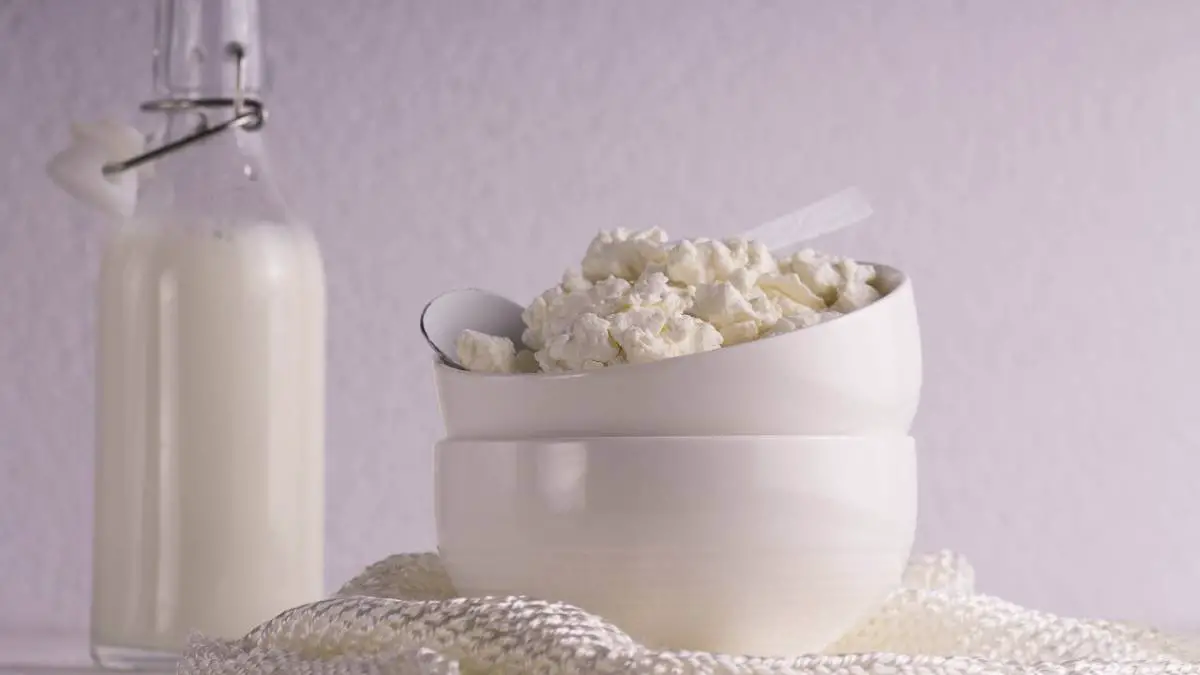
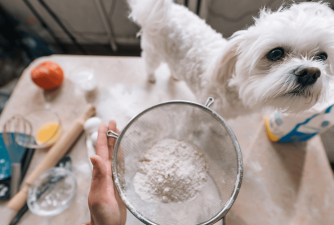

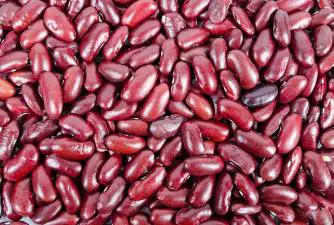
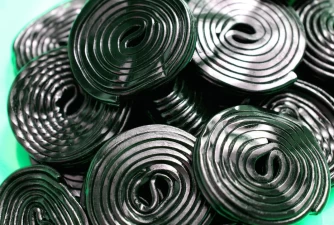

Share